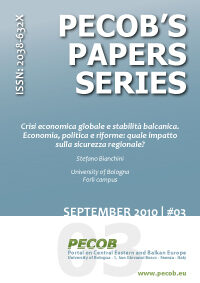and Balkan Europe
by IECOB & AIS Università di Bologna

This area collects and offers a wide range of scientific contributions and provides scholars, researchers and specialists with publishing opportunities for their research results
Global economic crisis and Balkan stability. Economics, politics and reforms: what impact on global security?
Crisi economica globale e stabilità balcanica. Economia, politica e riforme: quale impatto sulla sicurezza regionale?
September 2010 | #03
by: Stefano Bianchini
pp: 82
ISSN: 2038-632X

- September 2010 | #03
Abstract
The present paper addresses the question whether there is a threat to Balkan security that might be generated by the worsening and the prolongation of the global crisis.
This paper summarizes the results of a research carried out at the request of the Centro Militare di Studi Strategici (Rome, Italy) by Stefano Bianchini, Simona Mameli, Francesco Privitera, Leonas Tolvaišis, who are researchers at the Istituto per l'Europa Centro‐Orientale e Balcanica di Forlì. The research benefited also from the scientific contribution and comments by Franz‐Lothar Altmann (University of Bucarest), Will Bartlett (London School of Economics), Srđan Bogosavljević (University of Belgrado), Ylber Hysa (Institut of Albanian Studies, Prishtina), Vesna Bojičić (London School of Economics), Renzo Daviddi (European Commission), Matteo Ferrazzi (Unicredit, Milan), Eric Gordy (University College, London), Dušan Janjić (Forum for Ethnic Relations, Belgrade), Remzi Lani (Albanian Media Institute, Tirana), Craig Nation (US Army War College, Carlisle, PA), Stephanie Schwandners‐Sievers (University of Bologna), Franjo Štiblar (University of Lubiana), Boris Tihi (University of Sarajevo), Milica Uvalić (University of Perugia), as well as from the materials collected by the students of the Interdisciplinary Master’s in East European Research and Studies (MIREES) of the Universities of Bologna, St. Petersburg, Ljubljana, Vytautas Magnus of Kaunas and Corvinus of Budapest. A particular thanks goes to Anna Stagni (University of Bologna) for the second reading and her useful comments on the report. The report benefited also from an interdisciplinary workshop hold in Faenza (Italy) in February 2010. The outcomes of the workshop have been explicitly incorporated into the framework of the present report.
Economically, the main risks of destabilization come from the potential combination of the following factors: drastic reduction of FDI; relevant structural limitations of the available measures of the governments in order to face the crisis appropriately; increasing unemployment, particularly the long-term one. Under these conditions, the cuts of social expenses cannot be mitigated by alternative forms of solidarity, as for instance the remittances, since they might be reduced as a consequence of the crisis in the West, or the return to the enlarged patriarchal family system, because the fragmentation of the social relations, particularly in urban areas, does not allow any longer to rely on these arrangements. As a result, poverty and inequalities increase among social strata, between territories (regions) and – in certain situations, for instance in Macedonia – between ethnic groups.
Moreover, there is a shared perception that corruption and criminality are particularly rooted in the society: public administration and the entrepreneurial private world (especially building firms) are considered the areas most affected. Furthermore, the traffic of drugs is a pivotal vehicle in spreading corruption and strengthening the organized crime, which is also a producer of violence.
These phenomena originate both individual and collective insecurities, as well as new forms of intolerance among young people, in the sport environments, and later in the formation of gangs and other violent groups, attracted by fascist symbols, nationalist cliché xenophobia, racist behaviours against the Roma.
The fragile governments of the region found themselves between Scilla and Cariddi: on the one hand, they promote pro-EU policies (although with increasing difficulties, at least in Bosnia-Herzegovina); on the other, they are unable to abandon nationalist ideas and feelings, as they appear to be useful in order to preserve the mass consensus.
Nonetheless, the global crisis is also offering unexpected opportunities: the withdraw of the FDI may encourage the development of a local entrepreneurship and the strengthening of the consumering of local products; the reduced possibilities for migration may open new rooms to assert young brains at the local/regional level; the less insightful international presence in the area may facilitate the local policy makers to assume responsibility of the future of their own country, negotiating a more effective governance, while the presence of NATO into key areas of the Western Balkans may contribute to mitigate the impact of emotional behaviours and the emergence of new/old tensions.
Consistently, the complexity of the Western Balkan situation offers different outcomes to the impact of the global crisis at the local level.
Keywords
global crisis, Balkan stability, social inequalities, economic unbalances, new forms of intolerance, unexpected opportunities
Table of contents
Abstract
Introduzione
1 La crisi globale nei Balcani Occidentali.
2 L'impatto sociale della crisi.
3 La percezione della crisi nei Balcani occidentali.
4 Modelli di sviluppo e alternative. Le nuove sfide nei Balcani occidentali
5 Nuove forme di intolleranza e crisi dello spirito di cooperazione regionale
6 L'impatto della crisi sulla politica e le minacce di stabilità
Conclusioni
Bibliografia
Documenti
Libri e Saggi
Altre fonti e sitografia


 Download the full paper!
Download the full paper!





